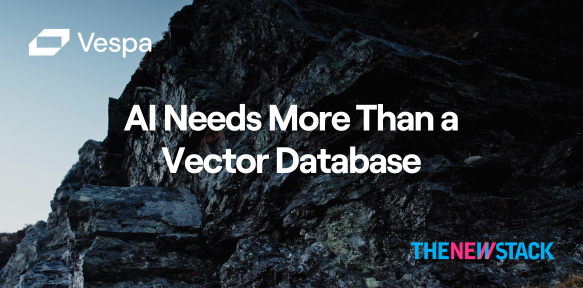AI in Insurance with Vespa.ai

The insurance industry is at a turning point, facing rising customer expectations, complex regulations, and the challenge of handling massive amounts of data - ranging from policy documents and IoT sensor feeds to claim photos and call transcripts.
Many insurers still rely on outdated, disconnected systems and manual processes, making it hard to keep up with real-time risk assessment, fraud detection, and personalized customer service. Meanwhile, digital-first competitors and insurance technology startups are using AI-driven platforms to offer faster claims processing, dynamic pricing, and self-service options, pushing traditional insurers to modernize.
Vespa.ai
Vespa.ai provides a powerful solution by combining advanced search, real-time data processing, and scalable AI model deployment. It’s already being used in critical applications across industries:
- A global 10 financial services institution uses Vespa to index 300 billion documents for retrieval, including all transactions and trades as well as all communications (messages, voicemail, etc.) to align with regulatory requirements.
- Vinted cut search delays increased transaction rates by switching to Vespa.ai, leveraging its ranking system to personalize recommendations across a billion listings.
- Spotify processes high volume searches per second on Vespa, using AI to match natural language queries like “podcasts about climate change” with the most relevant content.
Insurance in the future
For insurers, this means a platform that unifies scattered data sources - handling transcripts, PDFs, images, and structured claims data in one place - while running ultra-fast searches that combine AI models, regulatory requirements, and business logic.
Vespa can boost fraud detection by cross-checking handwritten claim forms with location data and past patterns to spot suspicious activity. Its real-time algorithms allow insurers to continuously update risk calculations as new data comes in, whether from telematics tracking driver behavior or AI analyzing customer service transcripts for fraud signals.
By removing the need for separate tools to manage search, AI processing, and databases, Vespa enables insurers to innovate faster with joined efforts across teams on various aspects of the business. The result is a shift toward real-time, data-driven decision-making is helping insurers stay competitive in an industry where speed and accuracy are everything.
AI Use Cases in Insurance with Vespa.ai
Fraud Detection and Prevention
Vespa.ai’s hybrid lexical-neural search and late-interaction models (e.g., ColPali) can enable insurers to detect subtle fraud patterns across unstructured text, images, and structured data.
- Multimodal Similarity Search: Compare claim documents, images (e.g., accident photos), and sensor data against historical records to flag inconsistencies. For example, mismatched timestamps or altered photos can be identified via vector similarity searches.
- ColPali Integration: By processing queries as “bags of vectors,” Vespa efficiently cross-references claim narratives with policy clauses, past fraudulent claims, and external databases (e.g., repair shop records). This reduces false positives while surfacing complex fraud rings.
- Real-Time Scoring: Vespa’s tensor computations can help with dynamic risk scoring mapped to claims, combining NLP-driven sentiment analysis (e.g., exaggerated injury descriptions) with metadata (claim history, location, demographic data).
Claims Processing and Management
Vespa can help accelerate claims resolution by automating data retrieval and decision-making:
- Hybrid Search Pipelines: Combine keyword filters (policy number, date) with semantic search to instantly surface relevant precedents, medical reports, or repair estimates from millions of documents.
- Contextual Enrichment: Use Vespa’s multi-vector embeddings to link claim forms to supplementary data (e.g., weather reports for flood claims) and trigger automated workflows (e.g., approvals for low-risk cases).
- Dynamic Ranking: Prioritize high-value claims using custom ranking models that weigh factors like claimant loyalty, claim complexity, and regulatory deadlines.
Document Management and Search
Vespa transforms document handling with enterprise-grade search and metadata management:
- Unified Indexing: Ingest and search Call transcripts, PDFs, emails, and scanned forms using Vespa’s native connectors. Semantic search retrieves clauses like “force majeure” across policies without exact keyword matches.
- Granular Filtering: Apply filters (e.g., “policies active in 2024”) alongside vector search to navigate documents by region, product type, or regulatory status.
Risk Assessment and Underwriting
Vespa enables real-time risk analysis through AI-driven tensor computations and scalable data fusion:
- Dynamic Risk Scoring: Integrate IoT data (telematics, property sensors), credit scores, and claims history into a single ranking model to compute premiums.
- Scenario Modeling: Use Vespa’s streaming updates to simulate risk exposure under varying conditions (e.g., natural disasters) and adjust underwriting criteria.
- Compliance Automation: Flag high-risk applicants by cross-referencing sanctions lists and regulatory databases via hybrid search.
Customer Experience Enhancement
Vespa powers personalized, low-latency interactions across channels:
- RAG-Powered Chat/Voicebots: Deploy chatbots that pull accurate, up-to-date answers from policy documents using Vespa’s semantic retrieval, minimizing hallucinations.
- Unified Customer Profiles: Combine call transcripts, emails, and claims into a single vector index for instant access to customer history, enabling tailored recommendations (e.g., discounts for safe drivers).
- Real-Time Alerts: Use Vespa’s <100ms latency to notify customers of claim status changes or policy renewals via preferred channels.
Conclusion
Vespa.ai equips insurers to modernize legacy systems with a platform that scales to billions of data points, delivers sub-second responses, and adapts to emerging AI advancements. By unifying search, ranking, and tensor-based analytics, Vespa reduces operational costs while elevating compliance and customer satisfaction. Its support for late-interaction models and hybrid pipelines ensures insurers stay ahead in a rapidly evolving market.
